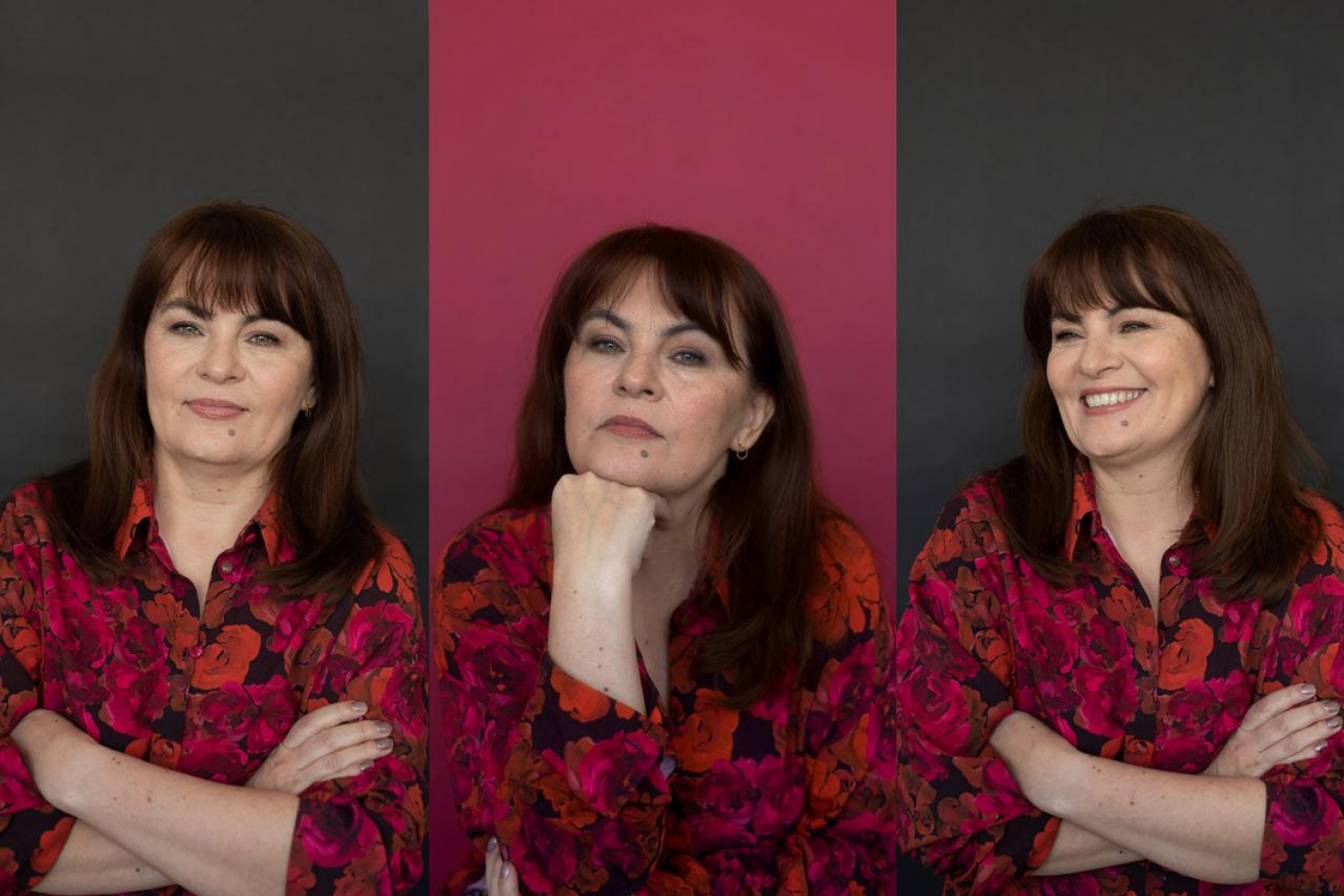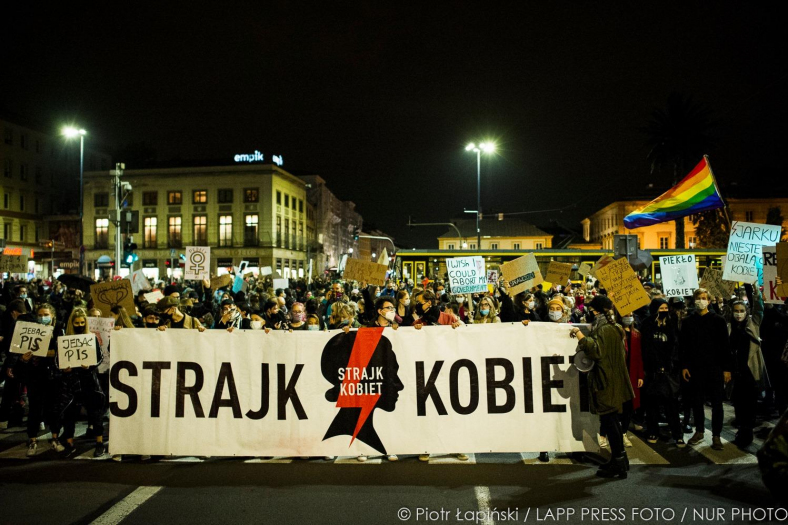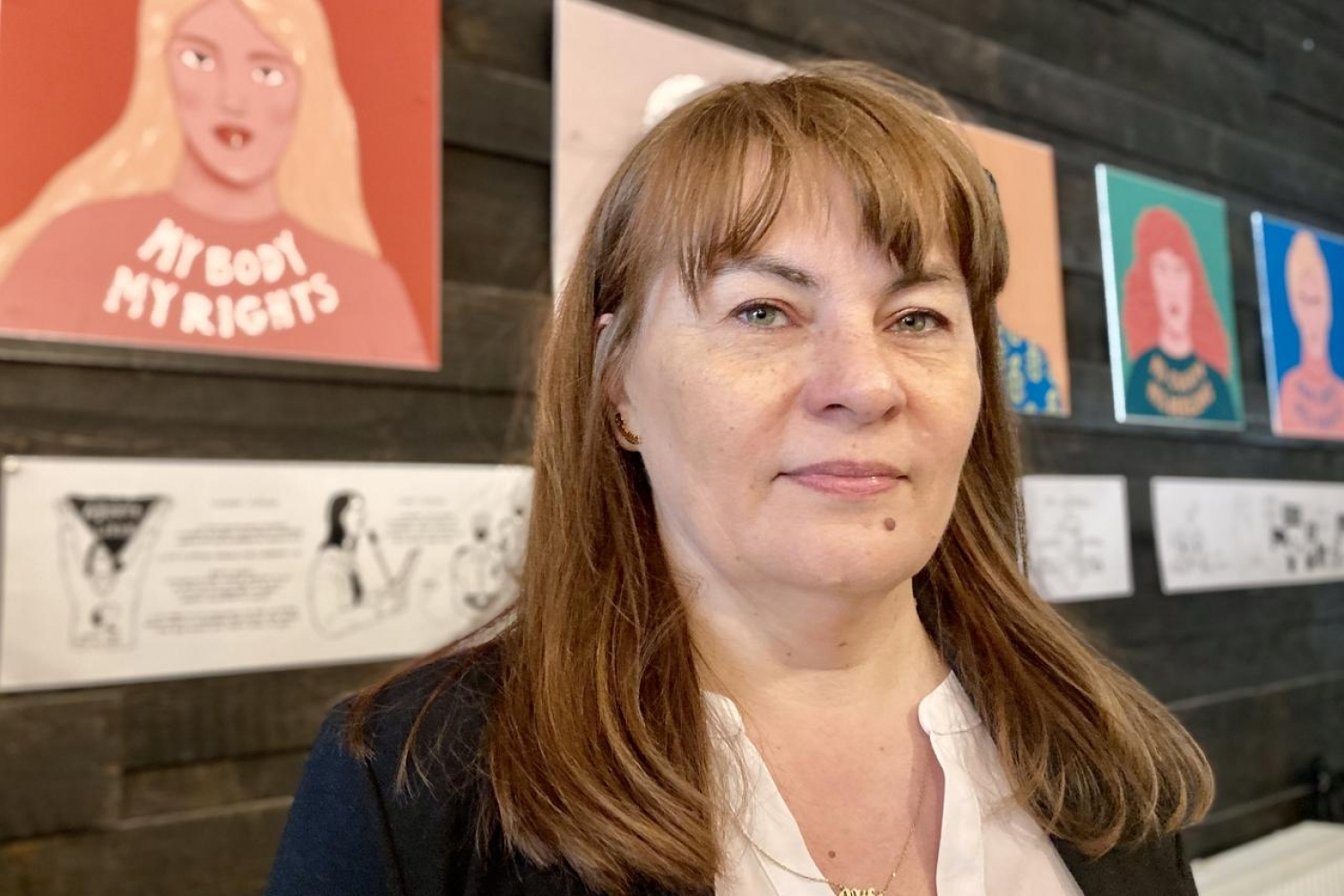Pieter Stockmans volgt het mondiale optreden van de Europese Unie, het Europese vluchtelingenbeleid, de evoluties in Midden-Europa en de regio ten oosten van de EU.
Convicted Polish activist: “Women’s bodies are the property of society”

© Justyna Wydrzyńska
In Poland, an activist was convicted of ‘assisting abortion’. The case has implications that go beyond the impact on women’s rights: it challenges the European legal order and shows the far-reaching consequences of political authoritarianism and Catholic fundamentalism with government power.
Translation of this article is provided by kompreno, using a combination of machine translation and human correction. More articles from MO* are included in kompreno‘s curation of the finest analysis, opinion & reporting — from all across Europe, translated into your language. Original source.
In a first for Europe, Polish activist Justyna Wydrzyńska has been convicted of “aiding and abetting abortion.” The European Commission refused to comment “on an individual case.” This is hard to reconcile with the high stakes of the case: it challenges the European legal order and shows the far-reaching consequences of political authoritarianism and Catholic fundamentalism with government power.
A fundamentalist Catholic lobby group posed as a “civil party advocate of the foetus” in a court case against an activist who sent abortion pills to a pregnant woman. The activist was convicted.
The activist is Justyna Wydrzyńska, a midwife and member of Abortion Without Borders, an activist collective that campaigns against the stigma of abortion and provides abortion counselling according to World Health Organisation (WHO) guidelines.
The lobby group is called the Ordo Iuris Institute for Legal Culture.
The country is Poland.
Chilling testimony
Ania, the pregnant woman, gave hours of detailed testimony to the court. She also wrote her story in an article for The Nation. It is only when you hear these women talk about what they have been through that you realise what strict abortion laws can do to a society.
In Ania’s case, state intervention went so deep that state power was exercised in the form of mental and physical suffering. She wrote that an unwanted pregnancy was torture. But it was also the obligation to continue an unwanted pregnancy that tortured her.
Two months ago, Wydrzyńska was convicted of “assisting an abortion” and “possessing unlicensed medicines with the intention of marketing them.” Three years earlier, she had been approached by Ania, a woman desperate to have an abortion. Ania was pregnant with twins, a victim of domestic violence and in poor health.
Wydrzyńska sent Ania a parcel of abortion pills by courier. “We never got in touch,” says Wydrzyńska. “I didn’t put the pills in her mouth. I had no influence on her decisions.”
Ania’s violent partner discovered the pills and reported them to the police. The man was not charged. He had already threatened to report a “kidnapping” when he found out that Ania was planning to travel to Germany for an abortion. He read every message on Ania’s mobile phone. “I am also coming out of a relationship with a manipulative partner, so that’s all I needed to know,” says Wydrzyńska. “I knew what kind of hell she was living in at home.”
A year and a half later, in November 2021, Wydrzyńska was charged. It was the first time in Europe that an activist had been prosecuted for assisting an abortion by providing abortion pills. She faces up to three years in prison.
‘EU countries, including Belgium, promised not to extradite me to Poland if I was sentenced to prison.’
Agnès Callamard, Amnesty International’s Secretary General, responded: “We must and will be ready to fight for our rights as, when and where necessary. If the charges are not withdrawn immediately, it could also inspire other governments seeking to restrict the activities of pro-choice activists.”
The charges have not been withdrawn.
The European Commission refused to comment “on an individual case,” but several EU member states felt that the case went far beyond this “individual case.” They were even prepared to protect a Polish citizen from her own government.
Wydrzyńska says that the embassies of Belgium, the Netherlands and Denmark assured her that they would not comply with Polish extradition requests. This was in case Wydrzyńska was sentenced to prison and wanted to leave Poland. The Belgian Foreign Ministry could not confirm this, but it shows that Poland is being watched in the European Union and around the world — as Canada was also involved.
In the end, Wydrzyńska was “only” sentenced to community service, so-called social service. Humiliating, yes. “But I did not expect to find real justice,” said Wydrzyńska.
MO* spoke to Wydrzyńska at the offices of Amnesty International Flanders in Brussels, the day after she spoke at the European Parliament on 25 April. Throughout the conversation, thoughts of The Handmaid’s Tale were never far away.
But there were also reflections on political persecution, on the direct influence of ultra-conservative Catholic lobby groups on government and judicial decisions, on the way police and doctors are instruments of patriarchal society, and on other dangerous developments since Poland’s Constitutional Court enabled one of the world’s strictest abortion laws in October 2020.

© Piotr Łapiński
Abortion in Poland
In October 2020, the Polish Constitutional Court ruled that even abortion in cases of severe foetal impairment and abortion because the child would be born with an incurable disease are illegal. This meant an almost total ban on abortion. In fact, almost ALL legal abortions were carried out for these reasons. Since then, pregnant Polish women in such situations have simply to carry the pregnancy to term.
The Catholic nationalist Minister of Justice even wanted to house these women in so-called prevention centres until they gave birth.Abortion is now legal in Poland only in two situations: if the woman’s health or life is in danger, or if the pregnancy is the result of rape or incest. Any person or doctor who assists in an abortion outside of these two approved situations risks up to three years in prison.
In the year following this decision, more than 32,000 people in Poland contacted Abortion Without Borders, a fivefold increase on the previous year. Abortion Without Borders helped more than 1,500 people to travel abroad for an abortion.
Amnesty International said the court case against you “paints a chilling picture of the consequences of these restrictive laws.” What has happened since the decision of the Constitutional Court?
Justyna Wydrzyńska: There have been several court cases. There was a trial against a man who took his wife to an abortion clinic in Germany. He was convicted. The law is now such that a woman seeking an abortion is completely on her own.
But the most widely reported case was against a woman who had ordered abortion pills for her daughter. Her social worker had ratted her out to the prosecutor. After all, the family was on welfare, and social workers have to report when they witness a crime. But they are a bit too enthusiastic, especially if they are ideologically opposed to abortion. They think they are heroes when they go to the police.
The ultra-conservative lobby groups
There is, of course, the relentless anti-abortion propaganda of some ultra-conservative lobby groups in Poland. What role did these lobby groups play in the court case against you?
Justyna Wydrzyńska: The judge simply allowed the Catholic lobby group Ordo Iuris to take the civil side as “defenders of the foetus.” They claim to protect the unborn. In this view, we are the murderers, but why don’t they protect Ania’s life? The life that is already born?
They even put pressure on hospitals when raped Ukrainian women came to Poland and asked for abortions. They asked how many Ukrainian women had had abortions because of rape. The Polish government even started talking about it, asking “whether raped Ukrainian women could get abortions in Polish hospitals.”
“More than 70% of the Polish population wants to legalize abortion on demand in the first 12 weeks of pregnancy.”
Surely rape is one of the permitted situations for abortion?
Justyna Wydrzyńska: Yes, but you have to report the rape first. Only when the prosecutor’s office starts an investigation and you have a certificate from them can you have an abortion.
In 2020, there were only two abortions due to rape in the whole country. In 2021, zero. And that was at the height of the COVID-19 pandemic, when whole families stayed at home and more women became victims of domestic violence.
Polish society may be more conservative than Belgian society, but the power of these ultra-conservatives and the current government is probably not representative of Polish society as a whole.
Justyna Wydrzyńska: Definitely not. More than 70% of the Polish population want to legalise abortion for psychosocial reasons on demand in the first 12 weeks of pregnancy. Just like in Belgium.
The government and the courts
Your case was decided unusually quickly. What does this mean?
Justyna Wydrzyńska: I think it confirms that this is a political case. That the government is using the courts to persecute me.
At the beginning of 2020, Ania told me that the police had seen my phone number on the envelope of abortion pills. I heard nothing more for a year. Then one day the police showed up at my door with a search warrant. After that, things moved quickly.
By December 2021, the public prosecutor had closed the case and sent the documents to the court. The first hearing was held on 8 April 2022. This was unusually fast for a Polish court.
The next parliamentary elections are six months away. Does that have anything to do with this?
Justyna Wydrzyńska: My prosecution is part of the election campaign. The ruling parties are using this case to please very radical voters. I spoke to left-wing politicians, mostly women, who supported me during the trial. They told me that the verdict would depend on how the two ruling parties communicated with each other. If they fought each other for ultra-conservative voters, I would certainly be punished.
The question was whether I would be sentenced to prison. That turned out to be too far-reaching, but they did not want to make me a victim of the whole thing. So I was given community service.
You often see governments in countries where there is no separation of powers trying to make a point with certain court cases. A kind of signal to society. They pick a victim and fabricate a case.
Justyna Wydrzyńska: The judge in my case was appointed by the prosecutor, who is also the Minister of Justice. She is one of the “new judges,” as we call them. The same day she sentenced me, she was promoted to the Court of Appeal. That means it was a reward. A journalist managed to find out. We didn’t know.
I know that I have been charged because I am a known activist. The court has already questioned me about stupid things. Stickers, for example. They are really trying to block our activities. But they haven’t been able to because we have a lot of trust in society. This case has finally given them a chance to catch one of us.
Not just for sending pills, but to threaten us. To show that we are watching your activities. So: “Be afraid.” But I am not afraid of the legal system of a government that is against women. We have known for years that we could end up in this situation.
‘Videos of my interviews with the press were shown in court as “evidence” of a crime. Those present wondered: what is happening here?’
Why do you think that the case against you was a political decision, while the other cases were purely legal?
Justyna Wydrzyńska: The prosecutor asked that my interviews with the press and my speech in the Polish Parliament on abortion be included in the file. In them I explain what Abortion Without Borders does, how we help.
The prosecutor wanted to show that I was committing the “crime” again, that I was “laughing in the face of justice.” Of course that’s not true, because what we do is different. We help. Of course I would do what I did again.
But this case was about that one act — providing abortion pills to a pregnant woman. It was not about our political campaigns to raise awareness of the importance of safe and legal abortion. I said I would not comment on that activism because it was not the subject of this case.
But if it was to be used as “evidence” of a crime, I demanded that these interviews be played in court. It was absurd to watch. Journalists and left-wing Polish MPs in the courtroom watching an activist talking to the press and this being used as evidence of a crime in court. Everyone was wondering: What is going on here?

© Pieter Stockmans
You mean it was also a spectacle of political authoritarianism, not just a threat to women’s rights? Did you get support from the moderate conservatives of Donald Tusk’s Civic Platform party, which is in opposition to the current government?
Justyna Wydrzyńska: No, they did not come to the courtroom or to the press conferences. No Civic Platform MPs were present during my speeches in the European Parliament. I only had contact with left-wing and liberal MEPs.
The current government’s control over the judiciary should worry the opposition. Are they not worried that your case shows the interdependence between the government, the judiciary and the police?
Justyna Wydrzyńska: As a democratic party in opposition, they should indeed be concerned. But I don’t know if they see this as something that goes beyond women’s rights.
At the end of the day, it is about human rights. Women’s rights are human rights.
Justyna Wydrzyńska: Robert Biedron, the Polish MEP from a social democratic party, said something that made me think. He said that there were only women journalists at the press conferences. If more people heard or read Ania’s testimony, they would think about the power of men in Poland. We don’t want men to feel sorry for us, we want them to take responsibility for our patriarchal society.
The police
Ania’s testimony reveals the power of patriarchy; it makes the reader feel almost physically uncomfortable.
Justyna Wydrzyńska: Indeed. After her husband reported her to the police, three policemen entered their house to confiscate the pills. I tried to imagine that situation: policemen and your own husband together, against you, weakened and full of stress. They are using the power of the system, of the government, of the patriarchy. And you have no choice but to give them the pills.
‘The police and your own husband are against you.’
The search of my house was also cruel. The police asked me to hand over all the abortion pills I had at home. They expected me to have whole stocks of them. When I gave them a few strips, they didn’t believe me. They searched the whole house as if they were expecting an organised gang. They took all our computers and phones, including those of my two children.
This is reminiscent of the days when family members informed on each other to a dictatorial government.
Justyna Wydrzyńska: The 1960s and 1970s in Poland. But it is happening again in the heart of Europe.
Doctors
Doctors play an important role in Ania’s testimony. You can feel her loneliness, her distrust of her abusive husband, the police and… the doctors in the hospital. She wrote about the condescending gaze of the doctors, as if they were looking down on her out of pity for a woman who had got herself into trouble, rather than helping her out of medical deontology.
Justyna Wydrzyńska: The safest place should be the hospital, where my life and health are treated as a priority.
But it was even worse because they threatened her in some way. One of the doctors said that they would try to feed her through the veins because she was too weak to carry the pregnancy. This means that the doctors recognised that she was physically incapable of doing so.
“No doctor has ever been criminalized for performing a legal abortion. But they dare not help. They are cowards.”
They forced her to eat in order to carry the pregnancy. It is reminiscent of The Handmaid’s Tale, where the role of women was to carry babies.
Justyna Wydrzyńska: This is an incubator society. Women’s bodies are the property of society and doctors behave like executors.
I cannot understand why people do not get help when their health is in danger. When doctors see a woman starving and say she can’t take it anymore, why don’t they ask her if she really wants to continue the pregnancy? That is torture.
But doctors are cowards. They are more concerned with their own legal security than with our lives.
This case will make doctors even more afraid. Can you blame them for being afraid?
Justyna Wydrzyńska: Yes, I blame them. Because never before has a doctor been criminalised for performing a legal abortion. And this was a legal abortion. They had evidence not only of Ania’s poor physical health, but also of her psychological fragility. The doctor wrote that she had suicidal thoughts, that she did not have the strength to continue this pregnancy. It was in the evidence.
The same thing happened to a pregnant woman from Czestochowa. The woman was in danger of dying, but the doctors waited for the foetus to die naturally. So I blame the doctors. They have power, knowledge and responsibility.
Maak MO* mee mogelijk.
Word proMO* net als 2798 andere lezers en maak MO* mee mogelijk. Zo blijven al onze verhalen gratis online beschikbaar voor iédereen.
Meer verhalen
-
Report
-
Report
-
Report
-
Interview
-
Analysis
-
Report










 Oxfam België
Oxfam België Handicap International
Handicap International